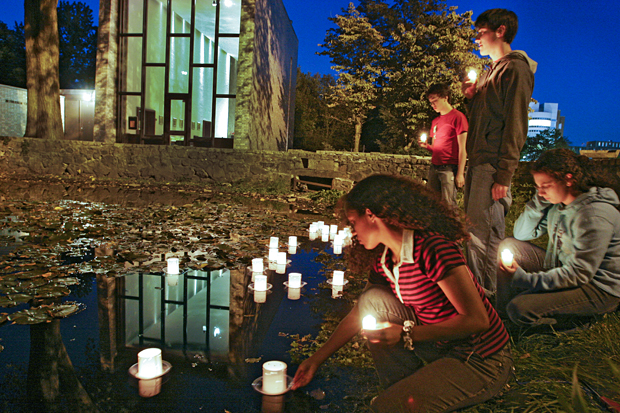9/11 anniversary culminates with memorial, meal on Sunday
Gatherings at Chapels Pond, Great Lawn meant as expressions of solidarity
 Photo/Mike Lovett
Photo/Mike LovettThe Brandeis community’s observance of the 10th anniversary of the 9/11 attacks continues with the weekly Friday Peace Vigil and, on Sunday, with a community gathering, memorial prayers and a meal.
The Peace Vigil will be held from noon to 12:20 p.m. at the Peace Circle near Usdan Student Center, where the Brandeis Interfaith Chaplaincy will focus its reflections on the anniversary. More information is available on the Facebook page of the vigil.
Observances culminate on the actual anniversary, Sunday, September 11.
Father Walter Cuenin, Catholic chaplain at Brandeis and coordinator of the University’s Interfaith Chaplaincy, and Student Union President Herbie Rosen ’12 are coordinating a memorial from 1:00 to 1:30 p.m. around Chapels Pond. (Levin Ballroom if it rains.) Brandeis President Fred Lawrence and Rosen will speak, and the chaplains will offer prayers and reflections.
Immediately following the memorial, there will be a community gathering and meal on the Great Lawn.
“We want to make this a moment not only a time to reflect back to the tragic events of that day but also to use this as a opportunity to recommit ourselves and our university to the work of interfaith dialogue and of making peace by learning to respect the differences in the world community,” said Father Cuenin.
“As chaplains, we wanted to make sure this anniversary was kept in a positive tone and with a focus on the hope of building a better world,” Cuenin said. “The gathering that follows the memorial will be an expression of our solidarity as a community with all of our differences.”
On September 6th students, faculty and staff gathered in the Shapiro Campus Center Art Gallery to reflect on this defining moment in American and world history and its ongoing impact at “9/11: How It Has Changed Our Thinking.”
The event, sponsored by the International Center for Ethics, Justice and Public Life, featured a panel comprised of Kanan Makiya, an award-winning author and influential commentator on the Arab world; Daniel Kryder, associate professor of politics and a Fulbright Scholar; Isabella Jean, MA ’06, an international peacebuilding and development consultant; and Michael Perloff '12, an Eli J. Segal Citizen Leadership Fellow.
Daniel Terris, director of the Ethics Center and Brandeis’ vice president for global affairs, moderated the wide-ranging discussion. The panelists shared their thoughts on the events of 9/11 and the repercussions, with a particular focus on their areas of expertise and experience.
Perloff shared his perspective as someone who – like many in the audience – was still a child on that day 10 years ago.
“My life as a citizen of America has certainly been changed, and the public way of life that I experience is very much shaped by 9/11. But as a thinker, as a student, as an individual, I don’t think that 9/11 has played that dominant a role in defining who I am,” he reflected. “I was 11 when the event happened. Many in the audience here were 12 years old, maybe younger than that….
"On the one hand, we were all old enough to recognize that there was something distinct happening beyond just adults acting strangely," he said. "On the other hand, I couldn’t emotionally process the event. Similarly, we were there for the consequences… of 9/11 as they happened … but we couldn’t fully understand their significance, we didn’t have the kind of context of studying the American presidency or coexistence work or the Middle East [as did the fellow panelists]. And so to a large extent we were both insiders of this event, but also outsiders to it, who had so much of our response to it transmitted to us from other people.”
“I think we are losing the distinction between war and peace,” said Makiya, who is the Sylvia K. Hassenfeld Professor of Islamic and Middle Eastern Studies and author of “Cruelty and Silence: War, Tyranny, Uprising and the Arab World” and “The Rock: A Seventh-Century Tale of Jerusalem,” “and that’s a very scary thing. The clarity that previously existed helped us as human beings or civilization in general develop things like rules of war and the Geneva Conventions. Once the line is blurred, those categories also fall apart. We’ve seen things like Guantanamo, things like Abu Ghraib, develop as a consequence.”
Asked by Terris to reflect on the concept of peace we share now as compared to how we thought of it a decade ago, Jean responded that she sees the pursuit of peace “as a very different enterprise. It involves a number of actors, and there’s more and more recognition of the need to really listen and understand what the domestic actors in these societies that have seen war and conflict and terrorism for years – a lot longer than the United States, and a lot more of it – actually do understand as peace, and what they define as sustainable, lasting change in their societies.”
“I think the biggest effect that one can find in terms of American national politics is additional presidential discretion, additional presidential detachment from the Constitution and from Congress,” suggested Kryder, a professor of politics and a scholar of the American presidency. But, he went on to say, “that is something that has been developing for decades.”
The Ethics Center coordinated the 5th anniversary Brandeis observance of 9/11. Read reflections by participants in that series of events.
Categories: General






